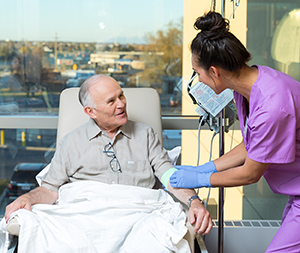Testicular Cancer: Chemotherapy
Testicular Cancer: Chemotherapy
What is chemotherapy?
Chemotherapy uses anticancer medicines to kill cancer cells. The medicines are made to attack and kill cancer cells, which grow quickly. Some normal cells also grow quickly. Because of this, chemotherapy can also harm those cells. This can cause side effects.
When might chemotherapy be used for testicular cancer?
Not everyone with testicular cancer needs chemotherapy. But it is an important part of treatment for some men. If you need chemo and what type you need will depend on:
The type of testicular cancer you have
The extent (stage) of the cancer
Your age and general health
Concerns you have about side effects
What treatments you have had in the past
Your healthcare provider may advise chemotherapy in any of these cases:
Your healthcare provider is concerned that your cancer might have spread outside the testicle. Chemotherapy might be used after surgery to kill any remaining cancer cells.
You have cancer that has clearly spread outside the testicle. Chemotherapy often works well to kill testicular cancer cells, even if they have spread to other parts of the body.
Your cancer has come back after your first treatment. Your healthcare provider might advise another course of standard chemotherapy. Or your healthcare provider may advise high-dose chemotherapy followed by a stem cell transplant. This is done less often, but it restores your blood stem cells.
How is chemotherapy given for testicular cancer?
Before treatment starts, you will meet with a medical oncologist. This is a doctor who treats cancer with medicine. The doctor will discuss your treatment choices and explain what you might expect.
Chemotherapy medicines for testicular cancer are usually given only by IV. This means the medicine is given through a small tube that is put into a vein. The medicine usually drips in slowly over several hours.
You usually get chemotherapy as an outpatient. That means you get it at a hospital, clinic, or healthcare provider's office. You can go home after you get the treatment. Less often, you may need to stay in the hospital during treatment. You'll be watched for reactions during your treatments. Each of your treatments may last for a while. You may want to take along music to listen to or something else that is comforting to you. You may also want to bring something to keep you busy, such as a book or mobile device.
To reduce the damage to healthy cells and to give them a chance to recover, chemo is given in cycles. A cycle is made up of treatment days followed by rest periods. Each cycle typically lasts a few weeks. Your healthcare provider will discuss your chemotherapy schedule with you.
What common medicines are used to treat testicular cancer?
Common medicines to treat testicular cancer include:
Bleomycin
Carboplatin
Cisplatin
Etoposide
Ifosfamide
Paclitaxel
Vinblastine
You may be given 2 or 3 of these medicines at the same time.
What are common side effects of chemotherapy?
Side effects of chemotherapy are different for everyone. They vary based on the medicines you get. Below is a list of the some of the most common side effects. Ask your healthcare team for details about the side effects for the medicines you take.
Hair loss. If you have hair loss, the hair will usually grow back after the treatment stops.
Infection. During your treatments, your white blood cell count may become low. This means your immune system won’t be working as well as it usually does. It’s a good idea for you to stay away from people who have illnesses that you could catch. It’s also a good idea to take care to prevent cuts and scrapes that could become infected. Your healthcare provider will check your blood counts regularly during your treatment. Be sure to let your doctor or nurse know if you have any signs of infection.
Nausea and vomiting. This side effect can be usually controlled with medicines. Ask your healthcare provider about it.
Diarrhea. If you have diarrhea, you should take antidiarrheal medicines as prescribed by your healthcare provider. You may also need to make changes in your diet.
Mouth sores. Chemo can sometimes cause mouth sores. These may make it hard for you to eat or swallow. The best way to help prevent this problem is to keep your mouth very clean and don't eat foods that could irritate your mouth.
Bleeding and bruising more easily. This is a possible side effect if chemo lowers your blood platelet counts. Platelets are needed to help the blood clot.
Fatigue. You may feel tired while getting chemotherapy. This usually goes away once treatment ends.
Some side effects happen more often with certain medicines.
Cisplatin and ifosfamide can cause kidney damage.
Cisplatin, carboplatin, paclitaxel, and etoposide can cause nerve damage (neuropathy). Nerve damage can lead to pain, tingling, and numbness in the hands and feet.
Bleomycin can damage the lungs.
Working with your healthcare provider
It's important to know which medicines you're taking. Write your medicines down, and ask your healthcare team how they work and what side effects they might have.
Talk with your healthcare providers about what signs to look for and when to call them. For example, chemotherapy can make you more likely to get infections. Make sure you know what number to call with questions. Is there a different number for evenings and weekends?
It may be helpful to keep a diary of your side effects. A written list will make it easier for you to remember your questions when you go to your appointments. It will also make it easier for you to work with your healthcare team to make a plan to manage your side effects.
Updated:
June 07, 2018
Sources:
Patient information: Testicular cancer (Beyond the Basics). UpToDate.
Reviewed By:
Alteri, Richard, MD,Alteri, Rick, MD,Gersten, Todd, MD,Images Reviewed by Staywell medical art team.,MMI board-certified, academically affiliated clinician
